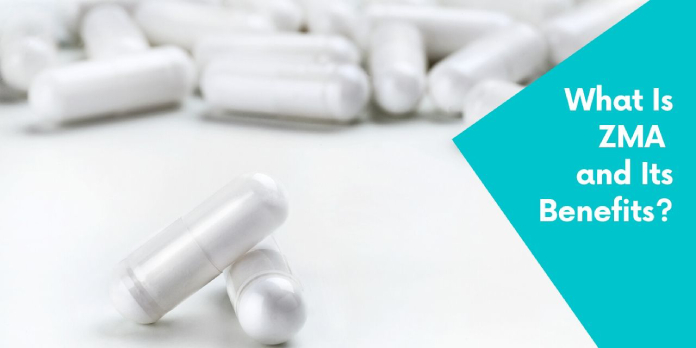If you want to ramp up your health and fitness, boost your testosterone, sleep faster and deeper, and recover faster after a workout or sporting competition, it’s as easy as A-B-C. Or rather, Z-M-A.
What is the ZMA Supplement?
ZMA is an all-natural mineral supplement. ZMA contains the following three nutrients:
- Zinc
- Magnesium aspartate
- Vitamin B6
It was invented by sports coach Victor Conte and first skyrocketed to popularity in the '90s when elite athletes like Bill Romanowski, Marion Jones and Barry Bonds all swore that it helped them achieve their sports fame.
But what does the scientific research actually say about ZMA, how ZMA works, and the health benefits of ZMA?
The Research on ZMA and ZMA Benefits
1. ZMA May Boost Your Testosterone Levels
Testosterone is the primary anabolic steroid responsible for bone growth, bone strength, muscle size and muscle strength, reports Harvard Medical School. It’s why many athletes and fitness enthusiasts, including those who have normal testosterone levels, ask their doctors for testosterone therapy.

“Even among men who started out with normal testosterone results, [those taking testosterone] noted loss of fat, increased muscle mass, better mood, and less anxiety. [...] Similar observations have been noted among women,” explains Harvard’s researchers.
ZMA may offer a natural, over-the-counter option.
In a double-blind, randomized study published in the Journal of Exercise Physiology, researchers gave ZMA supplements to NCAA football players at Western Washington University. After seven weeks of taking ZMA supplements twice a week, the football players experienced a significant increase in both testosterone and growth hormone.
Growth hormone, like testosterone, helps with muscle growth and strength. It also improves muscle repair, and may assist in speeding up recovery for athletes and fitness enthusiasts.
2. ZMA May Protect Against Muscle Fatigue
Whether you’re swinging kettlebells in the gym or throwing punches in the fighting ring, muscle fatigue can quickly set in during such high-intensity workouts.
Staying hydrated and raising your caloric intake, especially your levels of carbohydrates, can help guard against muscle fatigue. Taking ZMA may also reduce muscle fatigue when exercising.
Multiple studies published in the Neuro Enocrinology Letters, an international peer-reviewed medical journal covering neuroendocrinology, highlight the importance of oral zinc supplementation in preventing both muscle fatigue and perceived exhaustion.
One study monitored cyclists and the other study monitored wrestlers and both concluded that zinc, like the zinc in ZMA, shared similar fatigue-fighting benefits. Additionally, oral zinc supplementation boosted testosterone levels in both groups of athletes.
3. ZMA May Help You Sleep
Researchers have found that a lack of sleep may:
- Reduce your levels of testosterone
- Sabotage your levels of additional muscle-building compounds, like insulin-like growth factor 1
- Increase your levels of cortisol (a stress hormone linked with fat gain and muscle loss)
- Increase your risks of muscle atrophy and injuries
The different compounds in ZMA can help you catch more shut-eye.
For example, the magnesium in ZMA activates something called your "parasympathetic nervous system." Put simply, taking magnesium may help you to feel more relaxed, thus helping you to fall asleep.
And the zinc in your ZMA supplements has been shown to improve your sleep quality.
The effects may be even more pronounced if you take ZMA with additional sleep-supporting supplements. For example, a double-blind, placebo-controlled clinical trial found that taking zinc and magnesium with melatonin brought significant improvements in how long it took for you to fall asleep, your total sleep time, as well as your altertness and behavior the next day.
4. ZMA May Boost Your Immune System
Intense training schedules and prolonged exercise may weaken your immune system.
And falling ill in the middle of a rigorous fitness schedule can compromise your muscle gains and sabotage your goals.
ZMA may help. Each mineral in your ZMA supplements supports your immune system strength.
Zinc is linked with healing injuries and reducing your risks of getting infected by viruses and bacteria. For example, taking zinc is a popular method for reducing the duration of the common cold so you can get back into the gym faster.
Magnesium reduces chronic inflammation, which is linked with various chronic diseases. It may even help to reduce pain and help with pain management.
And vitamin B6 helps your body to generate more white blood cells, which guard your body against infection. Researchers have even noted that it can help to protect your immune system cells from dying.
5. ZMA May Improve Weight Loss
Are you looking to lean down after a bulk? Attain that much-vaunted six pack of abs? Burn off those last few pounds?
If weight loss is one of your goals, ZMA may help.
A study published in the Advanced Pharmaceutical Bulletin found that taking zinc “improves BMI, body weight, and triglyceride concentration.” A similar study found that zinc helped with maintaining a healthy appetite and suppressing cravings.
But it’s not just the zinc in ZMA that has benefits!
Finally, both vitamin B6 and magnesium may reduce water retention and bloating in women. Alas, there is currently no research done specifically on men.
How to Take ZMA
From NOW Sports’ ZMA to Optimum Nutrition’s ZMA, you have many options for preformulated ZMA pills. You can also find ZMA powders if you prefer to add your supplements to your pre-workout drinks or post-workout protein shakes.
If you prefer to build your own stack of zinc, magnesium and vitamin B6, the typical ratio is as follows:
- Zinc monomethionine: 30 mg
- Magnesium aspartate: 450 mg
- Vitamin B6: 10 mg
There is currently insufficient medical research on optimum timing for taking ZMA. However, anecdotally, many athletes, bodybuilders and fitness enthusiasts choose to take their ZMA in the evening before bed in order to support sleep and recovery.
You can also support your overall intake of zinc, magnesium and vitamin B6 through your diet.
Top dietary sources of zinc include:
- Oysters
- Beef
- Fortified cereals
- Soybeans Chicken
Foods rich in magnesium include:
- Dark green, leafy vegetables
- Brown rice
- Nuts like cashews and almonds
Whole food sources of vitamin B6 include:
- Salmon
- Potatoes
- Avocado
- Poultry like turkey or chicken
- Bananas




